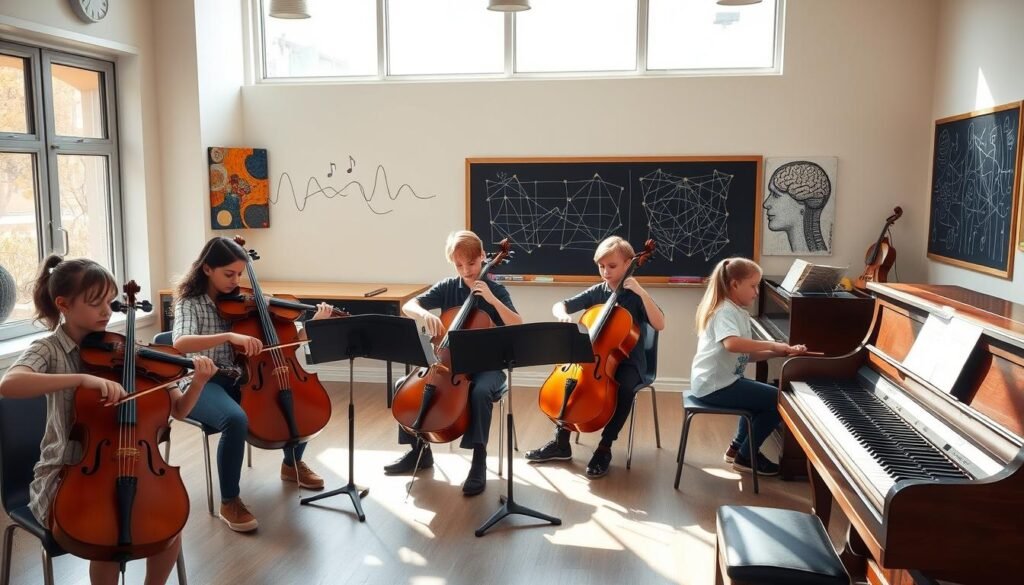Classical music has been studied a lot for its effects on the brain. It seems that listening to classical music can make our brains work better. This includes things like thinking faster, remembering things better, and making decisions.
Scientists think that classical music changes how our brains feel and work. It can make us feel calm or happy, which helps our brains work better. It can also make our brains more flexible, letting it change and grow.
Also Read: How To Write Music?
There are two main ideas on how classical music helps our brains. The first idea is that music makes us feel good and relaxed. This feeling helps us think better. The second idea is that music uses our brain’s thinking power, making us do tasks better.
Key Takeaways
- Classical music can enhance various cognitive abilities, such as processing speed, memory, and executive functions.
- The potential mechanisms involve changes in arousal, mood, and neuroplasticity.
- The “arousal and mood hypothesis” and the “cognitive-capacity hypothesis” explain how classical music can influence cognitive performance.
- Factors like music training, age, and individual differences can modulate the impact of classical music on cognition.
- Further research is needed to explore the practical applications and long-term effects of classical music on cognitive development.
Also Read: Top Benefits Of Music Education For Kids: Why Every Child Should Learn Music
Introduction to the Effects of Classical Music on Cognition
Music’s impact on our minds is truly fascinating. Background music, which we listen to while doing other things, has been studied a lot. The “Mozart effect” is another term that’s gotten a lot of attention. It looks into how classical music might change our thinking skills after we listen to it.
Background on the Influence of Music on Cognitive Processes
Background music and the “Mozart effect” might seem like different things, but they work in similar ways. The “arousal and mood hypothesis” says music’s good effects come from how it changes our feelings and energy levels. This, in turn, can make us think better.
Also Read: Top Music Streaming Services Of 2024: Which One Is Right For You?
The “cognitive-capacity hypothesis” has a different view. It says music can hurt our thinking if it uses up too much of our brain power. This is especially true for hard tasks that need a lot of focus and thinking.
The “Arousal and Mood Hypothesis” and the “Cognitive-Capacity Hypothesis”
The “arousal and mood hypothesis” believes music’s good effects come from how it changes our feelings and energy. Music that makes us feel good and more alert can help us think better. This is especially true for tasks that need us to pay attention, remember things, and process information fast.
The “cognitive-capacity hypothesis” says music can actually hurt our thinking if it takes up too much brain power. This is a big problem for complex tasks that need our full focus and deep thinking. Our brain can only handle so much at once, and music can take up some of that space.
Also Read: Music Theory Basics: A Beginner’s Guide To Understanding Music
“The effects of music on cognition are complex and can vary depending on the individual, the task, and the specific characteristics of the music itself.”
It’s important to understand these two views to see how music affects our thinking. Things like how music makes us feel, our mood, and how much our brain can handle all play a part in how classical music changes our thinking.
Neuroplasticity and Functional Changes from Musical Training

Research shows that learning music, especially from a young age, changes the brain a lot. Musicians have different brain areas for hearing, moving, and combining sensory and motor skills. These changes depend on how much and how long they practice music.
Also Read: How To Set Up A Home Music Studio?
Structural and Functional Brain Differences in Musicians
Studies show that musicians have bigger areas in their brains for sound processing, combining sensory and motor info, and complex movements. These changes show how the brain can change to meet music’s demands.
Functional brain scans also show more neural activity and connections in musicians. These changes help with hearing, moving, and feeling things together. They also help with thinking, feeling, and social skills.
Cognitive, Emotional, and Social Functions Engaged by Music
- Playing music uses many cognitive functions, like quick thinking, memory, focus, and planning.
- Music is key in emotional processing. Musicians feel and share emotions better through music.
- Playing music with others helps improve social skills and teamwork. It also builds a sense of community.
These discoveries show how musical training changes the brain’s structure and function. It affects cognitive, emotional, and social skills a lot.
| Structural Brain Changes | Functional Brain Changes |
|---|---|
| Larger gray matter volumes in auditory, motor, and sensorimotor integration areas | Enhanced neural activity and connectivity in regions involved in auditory processing, motor control, and multisensory integration |
| Reflect the brain’s remarkable plasticity and adaptation to musical training | Underlie the enhanced cognitive, emotional, and social abilities observed in musicians |
Impact Of Classical Music on Cognitive Abilities

Classical music has a big impact on our brains, especially on how fast we process information and remember things. Many studies have looked into how classical music affects our thinking skills. They found some interesting things about how this music helps our brains work better.
Effects on Processing Speed and Memory
Listening to classical music with a fast beat can make us think faster. It helps us process information quicker and make decisions faster. This is because the music makes us feel more alert and happy, which helps our brains work better.
Classical music also helps with different kinds of memory. It makes it easier to remember things from the past and understand words better. This is because music can make our brains more efficient at handling information.
But how much classical music helps can vary from person to person. It depends on things like how old you are, how much music you know, and your brain’s current abilities. Everyone can react differently to classical music.
“The link between classical music and cognitive abilities is a fascinating area of research, with studies revealing the potential benefits of this genre on processing speed and memory.”
Music psychology is always changing, and we’re learning more about how classical music affects our brains. This could lead to new ways to improve learning and help people with brain injuries.
The Mozart Effect: Fact or Fiction?

The idea that listening to Mozart’s music boosts brain power has sparked debate. Some studies showed benefits, but others didn’t get the same results. This leaves us wondering if the Mozart effect is real.
Investigating the Effects of Different Musical Genres
Researchers looked into how different music affects our thinking. They tested classical, rock, and white noise to see what works best. They found that music’s impact on our minds is complex.
It seems that the type of music, its speed, and how it sounds can change its effects. Some classical music might help our thinking, while other types might not have much effect.
“The impact of different musical genres on cognition is more complex than a simple ‘Mozart effect.'”
Scientists are still studying how classical music and cognition connect. They’re looking into how different music genres affect our brains. The Mozart effect might be more detailed than we thought, with different music affecting us in different ways.
Factors Modulating the Impact of Classical Music

Classical music’s effect on brain development varies a lot. It depends on musical training, age, and each person’s unique traits. Knowing these details helps us see how complex the link between classical music and thinking is.
Musical Training and Cognitive Benefits
Research shows that those with musical training do better with classical music. Musicians show better speed and memory in tasks related to music. This means classical music can be more beneficial for the brain if you’re used to music.
Age and the Cognitive Impact of Classical Music
Age also changes how classical music affects the brain. For older people, it might help keep or boost thinking skills. This music could be a shield against some age-related brain changes.
Individual Differences and Personalized Responses
Everyone reacts differently to classical music. What you like, your genes, and other things can change how it affects you. Some people might notice big changes, while others might not feel much.
“The cognitive benefits of classical music are not universal; they are shaped by the interplay of musical training, age, and individual differences.”
In short, classical music’s effect on thinking is complex. We need to think about musical training, age, and personal traits to understand it better. This shows why we should look at how music affects each person differently.
Practical Applications and Future Research

Studies on classical music and brain development have shown exciting results. These findings suggest ways to improve focus, concentration, and memory. They are useful in schools and workplaces.
Playing classical music while studying or working might help you focus better. It could also improve how well you remember things. This is because classical music can make your brain work better and keep you emotionally engaged.
- Using classical music to make learning or working easier
- Looking into how different music affects thinking skills
- Studying how often listening to classical music helps over time
As research goes on, we’ll learn more about how classical music helps the brain. We’ll find out what makes it work best for everyone. This will help us use music in a smarter way.
| Potential Future Research Directions | Significance |
|---|---|
| Long-term studies on classical music’s effects | Shows how music affects the brain over time and how much is best |
| Comparing different music types and their effects | Finds out which music is best for thinking skills |
| Looking at how age, music skills, and thinking abilities affect results | Helps make music use more personal and effective |
The study of classical music and the brain is growing. It has a lot of potential to improve how we think. We’re excited to see what new discoveries will come.
“Music has a powerful influence on the brain, and understanding its cognitive effects can unlock new frontiers in education, workplace optimization, and personal development.”
Also Read: How Do You Choose The Perfect Lyrics For Your Wedding Songs?
Conclusion
Studies show that classical music can boost cognitive skills like processing speed, memory, and executive functions. It does this by changing arousal, mood, and brain flexibility. Even though the “Mozart effect” debate is ongoing, many studies back up its positive effects on the brain.
More research is needed to understand how classical music affects thinking skills. We should look into how different types of music, individual traits, and learning settings impact these benefits. This could help make music a more effective tool for learning.
Knowing how classical music helps with thinking, educators and parents can use it more in schools and daily life. This could lead to better learning and thinking abilities for everyone. Classical music’s ability to improve cognitive skills is a big step forward for education and personal growth.
FAQs
Q: How does classical music help reduce stress levels?
A: Numerous studies have shown that listening to classical music can reduce stress by lowering cortisol levels in the body, leading to a calming effect that helps individuals feel more relaxed.
Q: Can classical music really improve your memory?
A: Yes, studies have found that classical music improves memory retention and recall. The calming effect of orchestral music can create an optimal environment for learning and cognitive processing.
Q: What are the therapeutic benefits of classical music?
A: Classical music has been shown to have therapeutic benefits, including reducing anxiety, lowering blood pressure, and improving overall mental health. It can also enhance mood and elevate emotional well-being.
Q: How does listening to music lower blood pressure?
A: Listening to relaxing classical music has been found to lower blood pressure by promoting relaxation and reducing heart rate, which in turn can decrease the workload on the heart.
Q: What is the “Mozart effect”?
A: The “Mozart effect” refers to a phenomenon where listening to classical compositions, particularly those by Mozart, is believed to temporarily enhance cognitive functions such as spatial reasoning and problem-solving abilities.
Q: Can classical music make a difference in a child’s cognitive development?
A: Yes, classical music can have a profound impact on a child’s cognitive development. Studies have shown that exposure to classical music from an early age can enhance brain development and improve academic performance.
Q: What types of classical music pieces are best for studying?
A: Slow and relaxing classical music pieces, such as those by Beethoven or other symphonies, are often recommended for studying as they help create a calm atmosphere conducive to focus and concentration.
Q: Is there a future for classical music in modern therapy?
A: Absolutely, the future of classical music in therapy looks promising. As more research uncovers the benefits of listening to classical music in therapeutic settings, its integration into music therapy practices continues to grow.
Q: How do classical compositions affect different parts of the brain?
A: Classical compositions have been found to stimulate various parts of the brain, enhancing creativity, emotional processing, and cognitive function. Studies have shown that music can activate brain regions associated with memory and learning.
Q: What are some benefits of listening to classical music regularly?
A: Listening to classical music regularly can reduce stress, improve memory, enhance mood, promote relaxation, and even lower blood pressure, contributing to overall mental and physical well-being.
Source Links
- https://www.ncbi.nlm.nih.gov/pmc/articles/PMC4197792/
- https://www.ncbi.nlm.nih.gov/pmc/articles/PMC3957486/
- https://www.christs.cam.ac.uk/there-mozart-effect-effects-listening-music-cognitive-processing-ability




